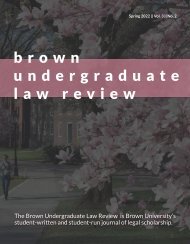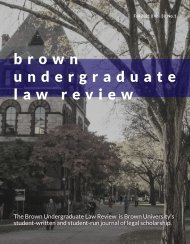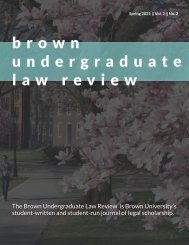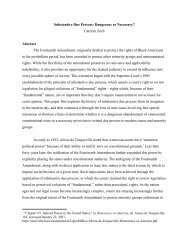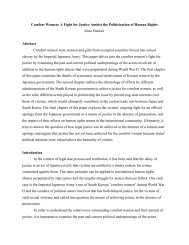Brown Undergraduate Law Review -- Vol. 2, No. 1 (Fall 2020)
We are proud to present the Brown Undergraduate Law Review's Fall 2020 issue. We hope you will all find our authors' works fascinating and thought-provoking.
We are proud to present the Brown Undergraduate Law Review's Fall 2020 issue. We hope you will all find our authors' works fascinating and thought-provoking.
You also want an ePaper? Increase the reach of your titles
YUMPU automatically turns print PDFs into web optimized ePapers that Google loves.
The Kosovo War: Wartime Sexual Violence Jurisprudence and State Action Toward Recovery
biological domination through arbitrary control of the
bodies and reproductive capacity of the targeted
population.? 6 One scholar remarks that, in the parallel case
of sexual violence in Bosnia, ?not because they are
women, but because the women are Muslim, Croatian, or
Serbian they are raped. And yet because they are women,
men are using against them their most effective weapon:
rape.? 7 In addition, largely in reaction to this widespread
regional violence, ?family, already a strong institution in
the Albanian community, regained strength and became
restructured as a new source of identity and resistance.? 8
However, as tensions escalated during the conflict in
Kosovo, this Albanian Kosovar cultural sanctity of the
family was increasingly preyed upon. Weaponized sexual
violence exploited cultural stigmas: victims feared family
sanctions, women anguished over giving birth to children
of the enemy, and men felt ashamed of their failure to stop
the rape and violation of their homes and women. The
depravity of these rapes was profound. As noted by
professor and feminist scholar Laura Sjoberg, ?[I]f war is
hell, then war and genocide are gendered hell.? 11 In this
manner, rape was strategically deployed to perpetuate the
breakdown of Kosovar society, and this imploded
foundational family units by exploiting traditional values.
In response to this violence, the North Atlantic Treaty
Organization (NATO) attempted peace talks in March
1999, but when Serbia refused to accept a NATO presence
in Kosovo, NATO launched Operation Allied Force. This
was an airstrike campaign that lasted 78 days before
Milo?evi? agreed to pull Serbian forces out of Kosovo in
June of 1999. A peace agreement was ultimately signed on
June 11, 1999, with Serb forces withdrawing from Kosovo.
The United Nations Interim Administration Mission in
Kosovo was then established in Prishtina and still exists
today, though with a smaller presence. Testimony from
former Kosovo President Atifete Jahjaga before the U.S.
trauma inflicted by rape insidiously persists for
House of Representatives Committee on Foreign Affairs
generations, since sexually transmitted diseases can impact
the fertility of their victims, women are ostracized for
bearing their rapists? children, and newborn babies are
often abandoned in order to ?wipe out the visible trace of
the sexual abuse.? 9 Serbian soldiers preyed upon women of
all ages, and many mothers recount their agony at not
revealed that, in total, there were 20,000 survivors of
weaponized sexual violence during the Kosovo War, and
that 800,000 Albanian Kosovars were displaced during the
conflict. The Kosovo War also resulted in the deaths of
approximately 13,000 people, and the 1,600 people who
remain missing are thought to be buried in mass graves. 12
being able to protect their daughters and young children
from the rape that they endured alongside them. 10 The
In February 2008, Kosovo officially declared its
independence from Serbia, and although the Republic of
6. Raphaelle Branche et al., ?Writing the History of Rape in Wartime,? in Rape in Wartime, ed. Raphaelle Branche and Fabrice Virgili and trans.
Helen McPhail (United Kingdom: Palgrave Macmillan, 2012), 10.
7. Ibid., 71.
8. Nita Luci and Linda Gusia, ??Our Men Will Not Have Amnesia?: Civil Engagement, Emancipation, and Transformation of the Gendered Public in
Kosovo,? in Civic and Uncivic Values in Kosovo: History, Politics, and Value Transformation, ed. Sabrina P. Ramet, Ola Listhaug, and Albert A.
Simkus (Budapest: Central European University Press, 2015), 201.
9. Branche et al., 13.
10. Atifete Jahjaga, ?Gender Based Violence in the Kosovo War,? interview by Olivia Hinch and Jonah Shrock, Brown Journal of World Affairs 26,
no. 1 (Fall/Winter 2019), 180.
11. Laura Sjoberg, Women as Wartime Rapists: Beyond Sensation and Stereotyping (New York: New York University Press, 2016), 23.
12. Kosovo?s Wartime Victims: The Quest for Justice: Written Testimony submitted before the U.S. House of Representatives Committee on Foreign
Affairs, 116th Cong. (2019) (statement of Atifete Jahjaga, former President of the Republic of Kosovo).
Brown Undergraduate Law Review
10




